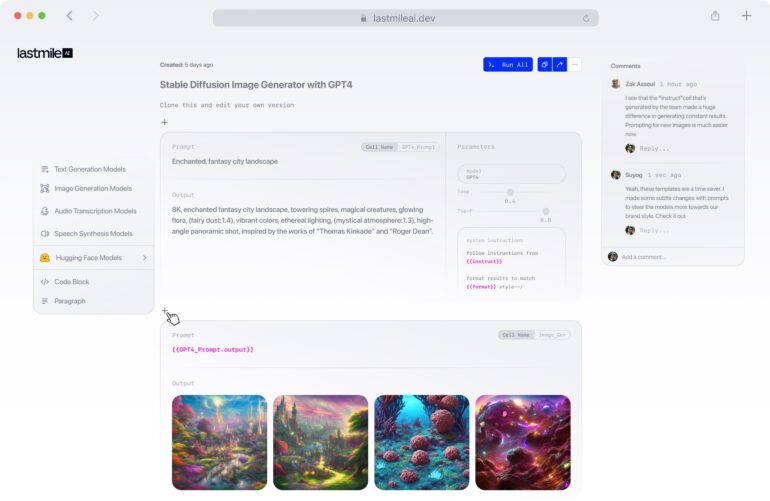TL;DR:
- LastMile AI has successfully raised $10 million in a seed funding round led by Gradient, with participation from key investors, including Google’s AI-focused venture fund.
- The funding is earmarked for expanding LastMile AI’s product offerings and growing its team.
- LastMile AI aims to democratize generative AI by simplifying tooling and workflows for software engineers.
- The company offers a comprehensive developer platform for AI app development, covering the entire lifecycle.
- LastMile AI faces competition but envisions significant growth opportunities in the rapidly expanding AI model operations market.
Main AI News:
In a significant move that’s set to reshape the AI development landscape, LastMile AI has successfully closed a $10 million seed funding round, spearheaded by Gradient, Google’s AI-focused venture fund. The round also saw participation from AME Cloud Ventures, Vercel’s Guillermo Rauch, 10x Founders, and Exceptional Capital. This injection of capital is earmarked for bolstering LastMile AI’s product and service portfolio and expanding its talented seven-person team.
Democratizing Generative AI
Sarmad Qadri, the co-founder and CEO of LastMile AI, expressed his vision for the company, stating, “Machine learning and the broader field of AI have faced several ‘AI winters,’ often due to constraints on computing resources, expertise, or high-quality training data. Our mission is to democratize generative AI by streamlining tooling, unifying workflows, and eliminating the need for deep technical expertise.”
Qadri, along with co-founders Andrew Hoh and Suyog Sonwalkar, previously served on Meta’s product engineering team, where they developed tools, including AI model management, experimentation, benchmarking, comparison, and monitoring tools tailored to machine learning engineers and data scientists. These tools served as the inspiration for LastMile AI.
“The recent surge in AI interest and adoption is driven by software developers and product teams incorporating generative AI into their toolkit. However, machine learning developer tooling primarily targets researchers and core machine learning practitioners,” Qadri emphasized. “Our goal is to empower builders by offering a new class of AI developer tools designed for software engineers.“
Navigating the AI Adoption Landscape
Many companies, faced with the complex task of integrating AI from scratch, grapple with harnessing the full potential of this technology. According to a recent S&P Global survey, nearly half of IT leaders believe their organizations aren’t yet ready to implement AI, with some estimating that it could take five or more years to fully integrate AI into their workflows. Meanwhile, about a third of organizations are still in the pilot or proof-of-concept stage.
Despite these challenges, business leaders remain optimistic about the opportunities AI presents. In a 2022 Gartner survey, 80% of executives expressed confidence in applying automation to any business decision. While model management remains a top roadblock, other factors like AI talent are not as significant as previously assumed.
Empowering Developers with LastMile AI
LastMile AI enables customers to create generative AI applications using text- and image-generating models from open- and closed-source providers. Developers can personalize these models with proprietary data and seamlessly integrate them into new or existing applications, products, and services.
The AI Workbooks module within LastMile facilitates experimentation with various models from a unified interface. The AI Workflows tool allows developers to string together different models, creating more intricate workflows. For example, an application can transcribe audio to text, translate the text, and apply a synthetic voiceover. The AI Templates module completes LastMile’s AI development suite by providing reusable development setups that can be shared with team members or the broader LastMile community.
Qadri articulated the overarching mission: “Our goal with LastMile is to provide a unified developer platform covering the entire AI app development lifecycle. Today, the AI developer journey is fragmented, requiring the integration of multiple tools and providers, along with a nuanced understanding of each step, raising the entry barrier. We focus on creating a platform accessible to non-machine learning software engineers for developing AI-powered apps and workflows.“
While LastMile AI faces competition from companies like LlamaIndex and LangChain, Qadri envisions significant opportunities in this rapidly expanding field. With the AI model operations market poised to reach $16.61 billion by 2030, according to reports, LastMile AI is primed to play a pivotal role in addressing the “last mile” challenges that enterprises encounter when incorporating AI into their applications and workflows. By providing robust AI developer tools for experimentation, evaluation, orchestration, and monitoring, LastMile AI stands as a crucial ally for businesses seeking to confidently embrace AI in their applications.
Conclusion:
LastMile AI’s successful seed funding round underscores the growing demand for accessible AI development tools. By streamlining the AI development process and targeting software engineers, the company is well-positioned to play a pivotal role in addressing the challenges enterprises face in incorporating AI into their applications and workflows. With the AI model operations market set to expand significantly, LastMile AI is poised for substantial growth and impact in this transformative industry.
Source

